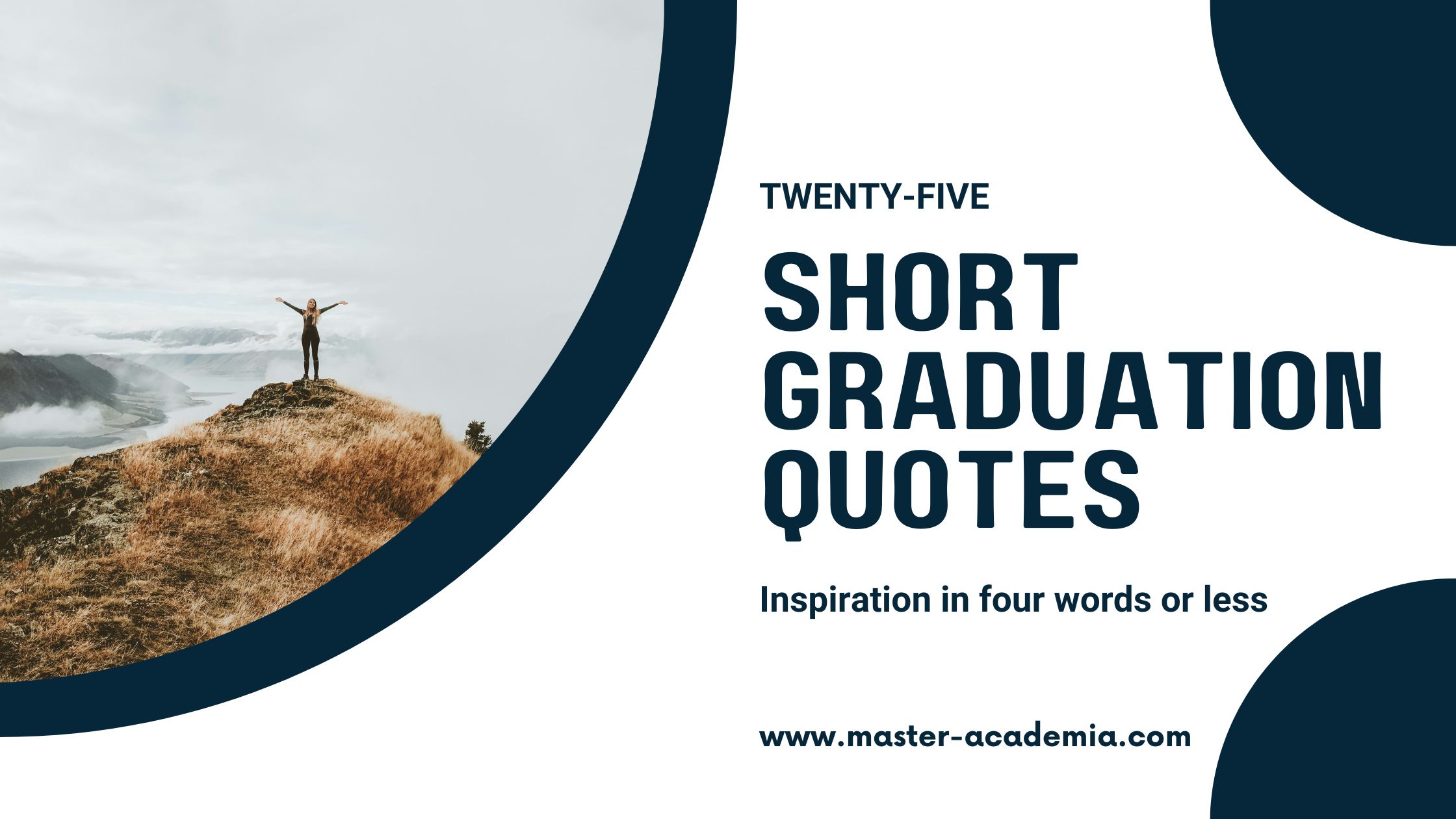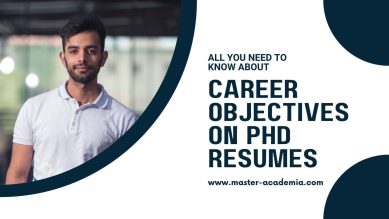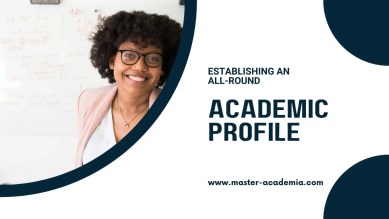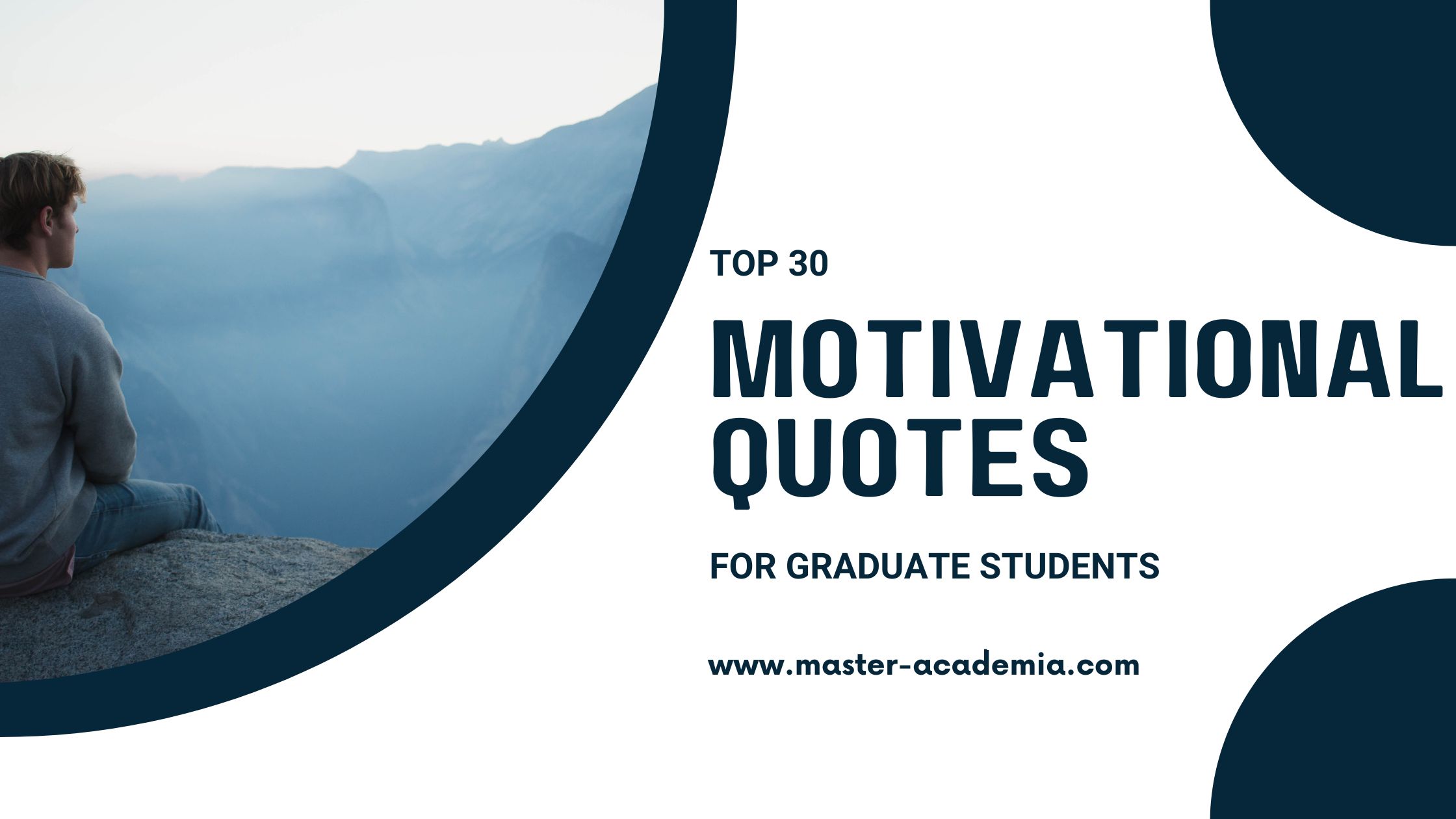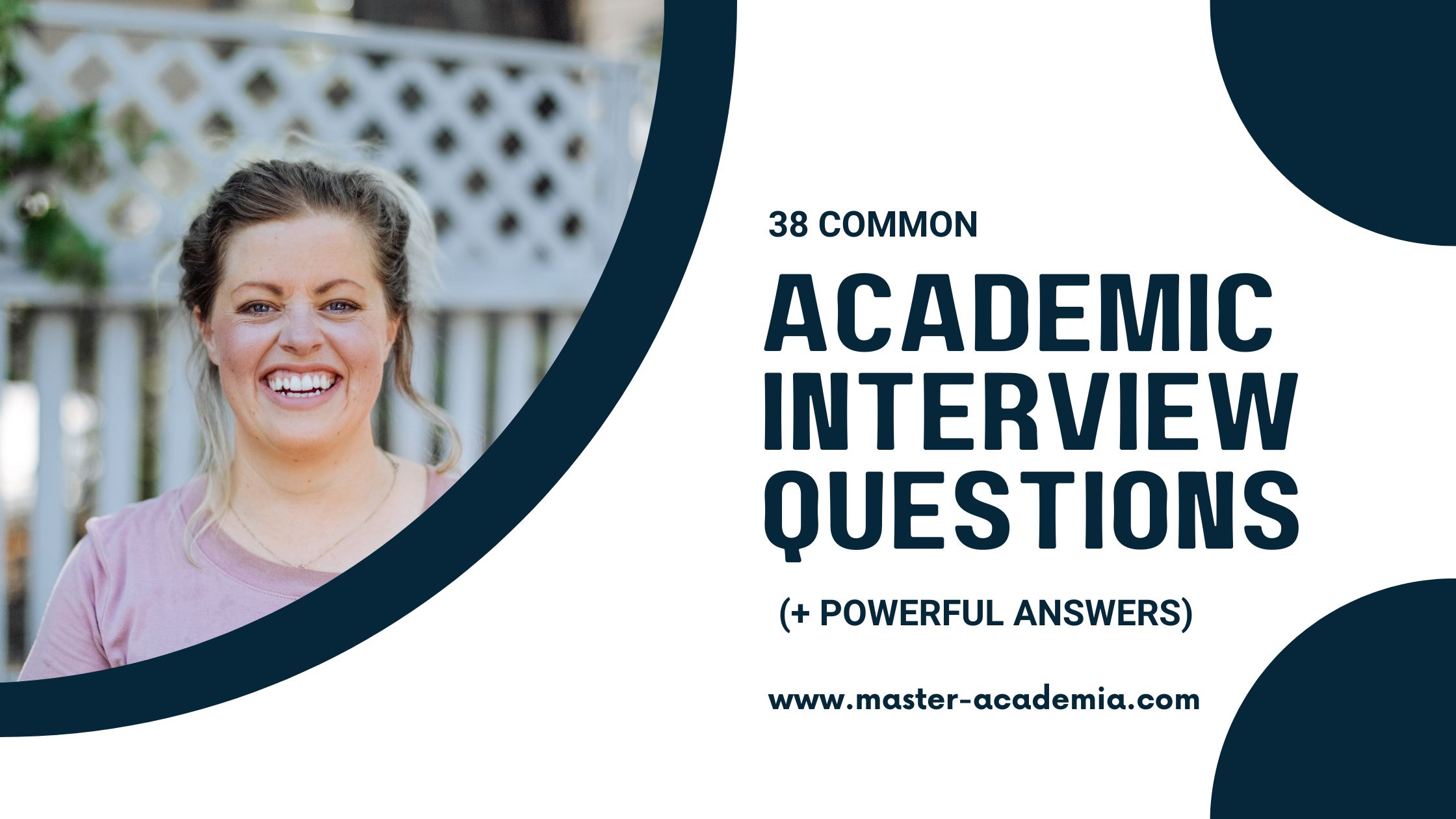
Academic job interview questions share some similarities with conventional job interviews, while also differing in terms of the specific aspects they focus on for academics. Whether you’re seeking a postdoctoral position or a university lectureship role, it’s important to understand the nuances of these interviews. Here is a compilation of 38 frequently asked academic job interview questions, complemented by compelling and empowering sample responses.
Disclaimer: This post may contain affiliate links, which means I may earn a small commission if you make a purchase using the links below at no additional cost to you. I only recommend products or services that I truly believe can benefit my audience. As always, my opinions are my own.
Contents
- Academic job interview questions exploring your motivation
- Academic job interview questions evaluating your compatibility with a department or research lab
- Academic job interview questions concerning your research and publications
- Academic job interview questions on research grants and proposals
- Academic job interview questions regarding your teaching and supervision experience
- Academic job interview questions centering on societal impact and research dissemination
- Academic job interview questions surrounding networks and collaborations
- Academic job interview questions testing your leadership potential
- Academic job interview questions exploring your personality
Academic job interview questions exploring your motivation
What factors influenced your decision to apply for this particular position?
Example answer: When I discovered the job opening, I was pleasantly surprised by the remarkable alignment between the position’s thematic focus and my personal objectives. The opportunity strongly resonates with my past research, my areas of interest, and my future aspirations. My previous work has extensively explored the impacts of rising sea levels on coastal communities. Building upon this foundation, my goal is to further my research in the field of climate change, encompassing both motivations and policy strategies, through active engagement with communities.
Why do you believe your profile aligns well with the requirements of the position?
Example answer: I am confident that my background has equipped me with the essential skills needed to excel in the responsibilities of this position. My PhD utilized mixed-methods, enabling me to establish expertise in both interview design and statistical analysis. Additionally, I successfully coordinated a research proposal involving multiple partners alongside my doctoral research, which provided valuable insights into grant proposals and research collaborations. In terms of teaching, I possess extensive experience supervising bachelor theses and have taken the lead in several discussion seminars during my PhD.
What drives your pursuit of an academic position?
Example answer: I appreciate the diverse range of tasks and responsibilities associated with an academic position. The academic freedom to conduct unbiased and impartial research, while pursuing my own interests and curiosities, holds great significance for me. My motivation to make significant contributions to the progression of cancer treatments is deeply rooted, inspired by personal connections to family members who have faced this disease. Moreover, my enthusiasm for mentoring and teaching drives me to impart knowledge and collaborate with individuals in meaningful ways.
You may also like: Establishing an all-round academic profile
Academic job interview questions evaluating your compatibility with a department or research lab
How does your research align with the research themes of the department/lab?
Example answer: The department’s emphasis on sustainability and global politics resonates with my research, which delves into political negotiations concerning wildlife conservation. Additionally, my work introduces a wildlife-focused dimension that, to the best of my knowledge, hasn’t been addressed yet. This makes me confident in my ability to collaborate effectively by identifying commonalities and distinctions across various realms while sharing my unique research insights.
How do you envision integrating with and contributing to the expansion of the department’s research profile?
Example answer: My research closely aligns with the work of Prof. Hilton and Dr. Sanchez, specifically in the realm of microplasticity. However, I’m also drawn to collaborating within transdisciplinary teams, and that’s where the department offers a compelling avenue to approach innovative solutions for sustainable materials. A distinct aspect that could pique the interest of others in the department is my emphasis on degradation methods, including direct photodegradation, which I believe complements the core research focus of the department.
Could you please share your expectations for the department or lab you will be working in?
Example answer: I envision the department or lab to provide a collegial and supportive environment where expectations are well-defined and communication is transparent. The presence of friendly and approachable colleagues, coupled with an intellectually stimulating atmosphere, is important to me. I am enthusiastic about the opportunity to engage in collaborative efforts. Moreover, having resources and guidance available for funding applications and individual projects would greatly contribute to my professional growth. In particular, I have aspirations of applying for several grants within the next five years, and any support in that endeavor would be immensely valuable to me.
What type of departmental atmosphere do you find most conducive to your preferred working environment?
Example answer: I firmly believe that a collaborative approach surpasses competition, and this is a value I highly prioritize in my workplace’s atmosphere. Within this setting, there’s a prevailing sense of collegiality and support where mutual assistance is the standard, all directed towards a shared goal. This becomes particularly important in cultivating a supportive environment for postgraduate students and early career scholars, who may encounter difficulties and truly merit our unwavering support.
What specific equipment and support would be essential for facilitating your work effectively?
Example answer: Given that my research primarily revolves around qualitative analysis, my equipment requirements are relatively minimal. However, having access to qualitative analysis software like Nvivo would significantly enhance my capabilities. As I previously mentioned, I’m also in the process of preparing applications for various grants in the upcoming months. Therefore, any form of assistance or support pertaining to grant writing would be immensely valuable to me.
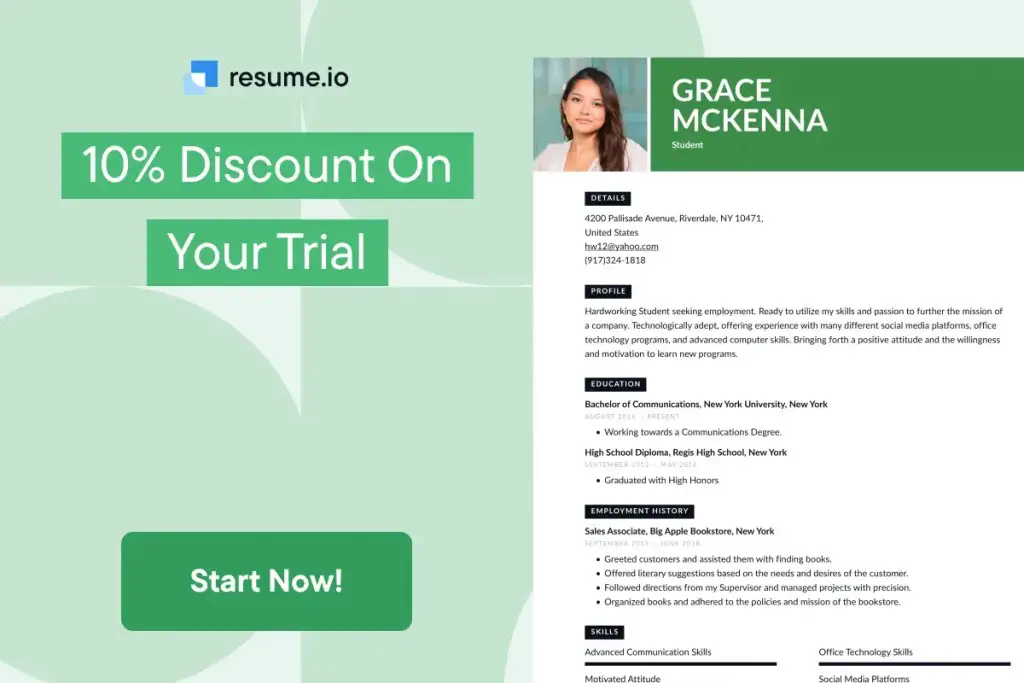
Academic job interview questions concerning your research and publications
Up to this point, how would you articulate the distinct contribution you have made to your research field?
Example answers: What distinguishes my research in the realm of social movements is my unique approach of utilizing a comparative perspective and innovative research methodology. While much of the existing social movement research tends to concentrate on either the global north or the global south, my work breaks this pattern by establishing a robust system of comparison across diverse contexts. This involves drawing insights from a range of cases to enrich the understanding of social movement dynamics worldwide. Notably, my most cited paper outlines this methodology, and I take great pride in its recognition within the academic community.
Could you identify which of your publications has had the most significant impact and elaborate on the reasons behind its influence?
Example answer: I consider my study on carbocyclic homologues of enols to be my most influential one. It is also my most cited publication. This work has served as a cornerstone for my research direction, concentrating on cyclopropanol, and played a pivotal role in building my reputation within the field of chemistry. The study has consistently generated interest, with ongoing inquiries from individuals seeking more information. Furthermore, it has sparked numerous collaborative opportunities, enhancing the exploration of this subject matter.
Could you outline your research plan for the upcoming years?
Example answer: In the coming year, my research plan involves delving deeper into two distinct research paths. Firstly, I am dedicated to conducting comprehensive investigations into educational reform within Tanzania and its broader implications for the economy. Secondly, I aim to establish a more robust and cohesive connection between this discourse and the framework of the Social Development Goals. Notably, the current body of research concerning SDGs and education in Tanzania lacks depth, presenting a significant opportunity for me to advance educational theories and contribute to more effective policy formulation in this realm.
What specific areas of research expertise are you aiming to cultivate and enhance?
Example answer: I intend to build upon my prior research focused on young adult novels and establish myself as a leading authority in this domain, especially within the context of the digital age. The ongoing shifts in this landscape are intriguing, and I am committed to becoming proficient in analyzing various viewpoints on body awareness among adolescents in this evolving context.
Which academic journals do you specifically aim to publish your research in?
Example answer: I have a well-defined publication strategy that involves submitting my work to high-ranking medical journals that lead the field in disseminating cutting-edge information about cardiovascular disease. At present, I have manuscripts under review at prominent venues like the Journal of the American College of Cardiology and the journal Circulation Research. In addition to these, my aspirations extend to future publications in eminent journals such as the European Journal of Heart Failure and the journal Circulation.
You may also like: Writing a successful academic CV (and a free template)
Academic job interview questions on research grants and proposals
Can you elaborate on your experience with applying for research grants?
Example answer: Last year, I participated in a collaborative ESRC grant proposal alongside co-applicants from the University of Liverpool and the University of Manchester. My primary responsibility was conceptualizing the research idea and, in particular, outlining the details for a designated work package that emphasized the practical implications of our research. While we progressed to the second interview stage, regrettably, we were not awarded the funding. During my doctoral studies, I also actively pursued various smaller grant opportunities. Notably, one of these applications proved successful and enabled me to initiate a modest research project centered around information technology in the nonprofit sector.
Could you elaborate on your strategies for developing new research proposals?
Example answer: I possess an expansive academic network that has enabled me to collaborate effectively with colleagues on an international scale. My postdoctoral position was part of a collaborative project that spanned Canada, Australia, and the United States. Through these collaborative experiences and the relationships I’ve formed, new research proposal ideas regularly arise. In general, I maintain a vigilant stance towards identifying fresh prospects and am happy to pursue even the most competitive grant opportunities. Translating my thoughts and concepts into succinct research proposals holds immense value in propelling my ideas forward, even when proposals are not ultimately successful. The process aids in refining ideas for subsequent rounds or future opportunities.
Are there particular funds or grants that you’ve identified and are considering applying for?
Example answers: I have intentions to submit an application for the forthcoming call for proposals from the National Institutes of Health. In preparation, I’ve already commenced conversations with colleagues regarding potential research ideas. Looking ahead, a few years down the line, I’m also considering pursuing an Emerging Scholars Grant opportunity.
Academic job interview questions regarding your teaching and supervision experience
Could you elaborate on your teaching philosophy?
Example answer: Certainly. My teaching philosophy is centered around fostering an engaging and inclusive learning environment. I believe that every student brings unique perspectives and experiences to the classroom, and it’s essential to create a space where these differences are valued and integrated into the learning process. I also strive to create a student-centered classroom where active participation, critical thinking, and open dialogue are encouraged. I see myself as a facilitator of knowledge, guiding students on a journey of exploration and discovery rather than simply imparting information.
Would you feel comfortable teaching courses that may not be directly aligned with your specific expertise?
Example answer: I make it a practice to engage with a broad range of literature and stay attuned to academic conversations within my discipline, even if they aren’t directly aligned with my immediate research focus. Teaching, in my experience, is a powerful way to delve deeper into subjects and gain a thorough understanding. In this regard, provided I have the appropriate preparation, I am comfortable with the idea of teaching courses within the broader field of anthropology that may not be centered on health and religion. I also firmly believe that a lecturer’s role encompasses igniting critical discussions. There’s no shame in acknowledging if I don’t have an immediate answer to a specific question. On the contrary, it presents an excellent opportunity to engage in a valuable exchange of perspectives and opinions with students, fostering a collaborative learning environment.
Have you undergone formal training in higher education teaching and obtained a teaching diploma?
Example answer: I successfully completed an 8-week Higher Education Teaching Certificate program. This comprehensive program covered a wide range of pedagogical approaches tailored for the higher education environment. It encompassed topics such as student engagement strategies and effective classroom management techniques.
How do you manage and accommodate diverse learning styles within your classroom?
Example answer: I strive to create an inclusive environment that caters to these differences. For instance, when introducing a new concept, I often use a multi-modal approach. This might involve providing visual aids like diagrams or charts for visual learners, engaging in interactive discussions for auditory learners, and incorporating hands-on activities or group projects for kinesthetic learners.
What aspects of your teaching do you aim to enhance?
Example answer: I believe I excel in guiding small discussion groups effectively but I do encounter a challenge when it comes to fostering engagement in larger lecture halls with student groups exceeding 40-50 individuals. This is an area would like to improve. I’m exploring various strategies, such as leveraging apps or technology, to stimulate active participation. This is particularly important to accommodate students who might feel hesitant to speak up or contribute in larger group settings.
How would you describe your supervision style?
Example answer: I would characterize my supervision style as adaptable to the needs of individual students. I consistently prioritize open communication and transparency, especially concerning expectations and deadlines. Nonetheless, I’ve observed that each student benefits from a personalized approach. Some thrive with a higher level of structure and guidance, while others are motivated by well-defined deadlines. On the other hand, certain students may require more confidence-building support rather than content-focused supervision.
Academic job interview questions centering on societal impact and research dissemination
How do you envision your work making an impact?
Example answer: I aspire to enhance litigation practices by offering novel insights and fostering theoretical discussions. While this might appear somewhat abstract, the tangible real-world implications are substantial. Particularly, I achieve this through my educational endeavors where I impart my research findings to my students. By equipping them with diverse perspectives, I prepare them to navigate different approaches once they embark on their legal careers.
In what ways are you sharing and disseminating your research findings?
Example answer: I employ a diverse range of channels to disseminate my research findings. In many instances, my projects entail collaboration with policymakers, leading to presentations of my research at various ministries. I’ve also ventured into the realm of public engagement by sharing my research on a podcast. To achieve this, I reached out to the podcast creator directly. Furthermore, I maintain a strong presence on platforms like LinkedIn and Twitter, actively sharing my research and staying informed about the work of fellow academics.
How do you envision the best approach to gauging your academic influence and impact?
Example answer: I recognize the significance of impact factors and other academic metrics within the academic realm, but I believe that concentrating solely on these indicators overlooks essential dimensions. As scholars, we bear a responsibility to society that extends beyond academic circles, urging us to enhance our science communication practices. Particularly in an era marked by growing skepticism towards expert opinions and a decline in trust in scientific evidence, I consider it crucial to underscore the societal value of our work. This pertains to improving people’s lives or contributing to evidence-based policymaking.
Academic job interview questions surrounding networks and collaborations
Are you currently engaged in any networks, and if so, what drives your active participation in them?
Example answer: I am a proactive participant in the American Membrane Technology Association. I consistently attend their annual conferences and have, in fact, taken on the role of early career representative since the previous year. This involvement provides me with a significant platform to not only expand my professional network but also engage in meaningful conversations about my research with established experts in the field. Furthermore, it facilitates connections with public agencies and industrial users, contributing to a well-rounded and impactful engagement within my field.
Do you collaborate with non-academic partners?
Example answer: During my doctoral studies, I organized a symposium that included industry representatives, during which I presented my research findings and facilitated subsequent discussions. This event proved to be highly productive, resulting in an invitation to participate in another industry panel. Building on this success, my aim is to nurture and strengthen these connections in the future, with the goal of forging a robust link between my research and practical industry applications.
What is your attitude when it comes to collaborations nationally and internationally?
Example answer: I have actively participated in the creation of three coauthored publications to date. One of these papers has already been published, another is currently undergoing the review process, and the third is still in the works. The published work involved collaboration with postdoctoral researchers from Germany and Japan. Despite the occasional challenges posed by coordinating across different time zones, the experience was incredibly rewarding and we plan to collaborate again in the future.
How would you approach the process of establishing new connections with societal partners for a research project?
Example answer: My initial step would involve clearly articulating the research’s significance, aiming to genuinely persuade potential societal partners to engage in collaboration. Upon identifying interested parties, I’d ensure flexibility for them to contribute to defining the research direction. While leadership plays a crucial role in such endeavors, maintaining a receptive mindset towards absorbing insights from societal partners’ experiences and engaging in collaborative knowledge production is equally important.
Academic job interview questions exploring your future plans and ambitions
Where do you see yourself in five years?
Example answer: Five years down the line, I aspire to have made significant strides in my research concerning biotechnologies. It is my goal to secure a grant for a more extensive research undertaking, which could potentially involve international collaborators, allowing me to create a meaningful impact. Additionally, I envision myself overseeing and guiding the progress of one or two postgraduate students, fulfilling a role as their mentor and supervisor by that point.
Are you inclined to remain within the realm of academia, or do you foresee your future taking a path outside of it?
Example answer: I actively engage in close collaboration with non-academic partners, and I find many aspects of their work intriguing. Nonetheless, my present aspiration is to pursue an academic trajectory, as I value the amalgamation of research and teaching. Therefore, I believe a lecturer position would align well with my goals.
Academic job interview questions testing your leadership potential
Could you provide an example of a situation where you assumed a leadership role or took charge of a task or project?
Example answer: In my current department, I am a member of a cohort consisting of PhD candidates and postdoctoral researchers, all of whom focus on topics surrounding global conflicts. We had initially intended to host a university-wide symposium, an avenue for each of us to present our individual research, but due to everyone’s busy schedules, we encountered repeated delays. Feeling a sense of frustration, I decided to proactively address the situation. I initiated coordination efforts with the team while also taking on the responsibility of organizing the event’s logistics. This included securing a suitable venue, distributing invitations, and even extending invitations to professors to participate as discussants. The result was an immensely successful symposium that left a significant impact. This experience illuminated the importance of stepping forward to take the reins and translate frustration into constructive action.
Have you already independently initiate projects in your academic career?
Example answer: During my time as a PhD student, I naturally operated under the guidance of my supervisors. I was also embedded in a wider research project with well-defined research objectives. However, even within this structured framework, I was able to contribute my own ideas and make decisions during task implementation. As an example, one of the objectives was to comprehend how young individuals engage with modern art. Instead of solely conducting interviews, which was suggested by my supervisors, I took the initiative to develop my own small project, which involved organizing an art workshop spanning three consecutive Saturdays for children aged 12-15. With parental consent, I utilized these workshops for participant observation, to generate additional insights. I really enjoyed organizing it, and the additional insights ultimately enriched the outcomes of the research project.
How would you describe your leadership style?
Example answer: I would characterize my leadership style as collaborative and adaptable. I place a strong emphasis on cultivating an environment that encourages the open exchange of ideas and the integration of diverse viewpoints. I view this as essential in the pursuit of generating novel scientific insights. My approach involves guiding and motivating others, empowering them to work independently while offering the necessary support to collectively attain our objectives.
Academic job interview questions exploring your personality
What are your personal strengths and weaknesses?
Example answer: I excel in coordination and multitasking, yet I admit to occasionally overcommitting due to my genuine enthusiasm for the multitude of opportunities available. This encompasses tasks like delivering guest lectures, collaborating on fresh articles, and crafting new proposals. On occasion, I come to the realization that I’ve taken on more than I can handle and should exercise greater selectivity. While I do manage to complete everything I undertake, I acknowledge that this can impact my equilibrium between work and personal life. I’m actively addressing this area to achieve a better balance.
What kind of support or assistance do you require from a manager?
Example answer: Typically, I operate with a high degree of independence. However, I find great value in engaging in collaborative brainstorming sessions, especially when it comes to discussing strategic career decisions that can have a lasting positive impact on my research endeavors.
How do you manage or cope with stressful situations?
Example answer: I’m a strong advocate of crafting to-do lists. The process of jotting down tasks and arranging them based on their level of importance and urgency has a calming effect on me. It’s like devising a strategic plan to tackle everything on my plate. Another technique I’ve found beneficial is limiting my email checks during the day. Instead of constantly having my inbox open, I’ve adopted the practice of designated periods for email review. This focused approach aids my concentration, especially when I’m feeling a bit stressed. I’ve found it beneficial to concentrate on one task at a time and reserve time for checking emails, typically at the beginning and end of my workday.
